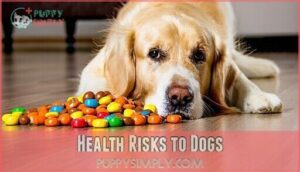This site is supported by our readers. We may earn a commission, at no cost to you, if you purchase through links.
 No, you shouldn’t let your dog eat Reese’s Pieces.
No, you shouldn’t let your dog eat Reese’s Pieces.
While they don’t contain actual chocolate like regular Reese’s cups, these candies still pose risks to your furry friend.
They’re packed with sugar, artificial colors, and unhealthy fats that can upset your dog’s stomach and contribute to obesity.
Even small amounts might trigger digestive issues like vomiting or diarrhea.
The peanut butter filling itself isn’t toxic, but the candy coating offers zero nutritional benefits.
When your pup gives you those begging eyes, remember that a proper dog treat is always the safer choice.
Understanding which human foods are actually safe for dogs can be a real game-changer.
Remember, it’s crucial to prioritize your dog’s health and make informed decisions about their diet, choosing options that are safe for them.
Table Of Contents
- Key Takeaways
- Dog Consumption Risks
- Can Dogs Eat Reese’s
- Health Risks to Dogs
- Treating Reese’s Ingestion
- Preventing Future Ingestion
- Frequently Asked Questions (FAQs)
- What happens if my dog eats Reese’s pieces?
- How much chocolate is in Reese’s Pieces?
- Will a little candy hurt a dog?
- Is Reese’s brand peanut butter safe for dogs?
- What are the signs of pancreatitis in dogs?
- How much fat should dogs consume in a day?
- How can I tell if my dog has a peanut allergy?
- Are Dentastix a healthier alternative to Reese’s Pieces?
- What should I do if my dog ate expired Reese’s Pieces?
- How much hydrogen peroxide per pound weight?
- Conclusion
Key Takeaways
- While Reese’s Pieces don’t contain actual chocolate like regular Reese’s cups, they’re still packed with sugar, artificial colors, and unhealthy fats that can upset your dog’s stomach and contribute to obesity.
- If your dog does eat Reese’s Pieces, watch for gastrointestinal symptoms like vomiting, diarrhea, or abdominal pain, and be prepared to contact your vet if symptoms worsen.
- You can prevent future incidents by storing candy securely in airtight containers, using child locks on pantries, or placing treats on high shelves where curious dogs can’t reach them.
- Instead of sharing human candy, you should stick to dog-specific treats that are formulated for their nutritional needs and won’t pose health risks.
Dog Consumption Risks
You might think sharing a treat like Reese’s Pieces with your dog is harmless, but it can actually be risky.
From chocolate to artificial sweeteners, some ingredients can upset their stomach or even be toxic.
Chocolate Toxicity Levels
Chocolate toxicity in dogs depends on the type of chocolate and theobromine amounts.
Dark chocolate is the most dangerous, while milk chocolate poses moderate risks.
White chocolate has minimal theobromine but can still upset your dog’s stomach.
Toxicity factors like your dog’s size and the chocolate type determine the risk of chocolate poisoning, which can cause serious dog health risks, so stay cautious!
Peanut Butter Safety
Peanut butter can be a tasty treat for dogs, but it’s not always safe.
Watch out for brands with added sugar, high sodium content, or aflatoxin concerns. Stick to safe brands without xylitol, a toxic ingredient in some candy.
While Reese’s Pieces contain peanut butter, they’re not a healthy alternative. Opt for unsalted, dog-specific peanut butter to avoid dog health risks, ensuring a safe choice with no xylitol.
Xylitol and Raisin Presence
While peanut butter in Reese’s Pieces might seem harmless, always check for hidden dangers like xylitol or raisins—both toxic foods for dogs.
Thankfully, Reese’s Pieces don’t contain these harmful ingredients, but it’s smart to stay cautious. Raisins cause kidney failure, so it’s important to avoid them.
- Read ingredient labels carefully for xylitol dangers.
- Avoid candies with raisin toxicity risks.
- Stick to safe alternatives like dog-friendly treats.
Can Dogs Eat Reese’s
Regarding Reese’s Pieces, they might seem harmless, but they’re not exactly dog-friendly. These candy-coated treats aren’t made with pure chocolate, so the risk of chocolate poisoning in dogs is lower.
However, they’re still loaded with sugar and fat, which can upset your pup’s stomach. The candy ingredients, like peanut butter, are generally safe, but you should always check for toxic foods for dogs, such as xylitol or raisins, in similar products.
Dog size impacts how much trouble these snacks can cause—what’s mild for a 50lb dog could be serious for a smaller one. Veterinary advice, like from the JustAnswer platform, often suggests avoiding candy altogether.
Long-term effects? Probably not, but why risk it? Candy’s bad for dogs. Similarly, high sodium content in snacks can also pose a risk.
Health Risks to Dogs
Reese’s Pieces might seem harmless, but they can pose serious risks to your dog’s health.
From upset stomachs to potential chocolate toxicity, it’s important to know what to watch for.
Gastrointestinal Symptoms
Upset stomachs from sugary treats can disrupt your dog’s gut, leading to vomiting, diarrhea, and dehydration—watch for these signs carefully.
Eating Reese’s Pieces can upset your dog’s stomach, leading to vomiting, diarrhea, or even bloody discharge.
Watch for abdominal pain, appetite loss, or signs of dehydration risk. These symptoms can disturb their gut microbiome, making recovery slower.
While not as toxic as chocolate poisoning in dogs, gastrointestinal symptoms still need monitoring to help your furry friend bounce back quickly.
Consider options like prebiotic fiber treats to aid digestion and support your dog’s health, reducing the risk of dehydration.
Theobromine Poisoning
Theobromine, found in chocolate, is a sneaky culprit behind chocolate poisoning in dogs.
Unlike humans, dogs metabolize it slowly, making even small amounts risky. Toxicity levels depend on chocolate type, with dark chocolate being the worst.
Watch for symptoms like vomiting, diarrhea, or a racing heart.
- Theobromine Sources: Dark chocolate, cocoa powder
- Safe Thresholds: 100mg/kg toxic dose
- Veterinary Intervention: Needed for severe cases
Sugar and Fat Dangers
Too much sugar and fat in foods like Reese’s Pieces can harm your dog’s health.
Obesity risks, dental problems, and even pancreatitis threaten dogs living on sugary treats.
Their liver strains to process excess fat, potentially linking candy like this to diabetes.
Chocolate poisoning in dogs gets attention, but candy’s other dangers can silently derail your dog’s nutrition, posing significant risks due to sugary treats.
Treating Reese’s Ingestion
If your dog eats Reese’s Pieces, quick action can help prevent an upset stomach. Start by checking how much they ate, and be ready to monitor for any unusual symptoms.
Inducing Vomiting
If your dog ate Reese’s Pieces, inducing vomiting can help.
Use 3% hydrogen peroxide:
- Give 1 teaspoon per 10 lbs of body weight.
- If no vomit after 15 minutes, give a second dose.
- Never exceed three tablespoons.
- Always follow up with professional supervision.
Quick action reduces chocolate poisoning risks but call an emergency vet if unsure!
Consider products to help with the process to ensure quick action.
Monitoring for Symptoms
After inducing vomiting, keep a close eye on your dog.
Watch for behavioral changes like pacing or lethargy signs. Appetite changes, unusual stool consistency, or dehydration can hint at trouble.
Reeses Pieces aren’t as dangerous as dark chocolate, but chocolate poisoning in dogs still happens. If symptoms worsen, follow veterinary advice or contact emergency vet care immediately.
Withholding Food and Water
After inducing vomiting from Reeses Pieces ingestion, give your dog’s GI tract a break by withholding food and water for 2-4 hours.
This helps settle their stomach and reduce irritation. Gradually reintroduce hydration—small sips work best.
Later, start with a bland diet like boiled chicken or rice. Watch for lingering signs of chocolate poisoning.
Consult emergency vet care if symptoms worsen. Without water, dogs can experience risks of dehydration, which may lead to severe health issues, and it is crucial to address dehydration risks promptly.
Preventing Future Ingestion
You can keep your dog safe by storing candy and other harmful foods out of reach, like in a high cabinet or a sealed container.
It’s also a good idea to learn which human foods are unsafe for dogs, so you can avoid any accidental mishaps and keep your dog safe.
Secure Food Storage
Keep your snacks safe from prying paws.
Use airtight containers for treats like Reese’s Pieces to prevent accidental access.
Secure pantries with child locks or go for elevated shelves where curious dogs can’t reach.
Locked cabinets are another great option.
These steps reduce the risk of chocolate poisoning, xylitol exposure, and prevent dog poisoning incidents.
Consider food storage solutions for maximum safety.
Stay ahead—dog owner safety starts here!
Regular Veterinary Checkups
Through regular veterinary checkups, you’ll catch potential health issues before they become serious problems.
Schedule annual visits for preventative care, including vaccination updates and parasite control.
Your vet can provide personalized advice about your dog’s dietary needs and restrictions.
These appointments also offer opportunities for dental health assessments and early detection of any conditions that might make your dog more susceptible to complications from accidental ingestion of harmful foods.
Regular visits also allow for a thorough dog exam.
Educating on Toxic Foods
While regular checkups help catch issues early, knowing which foods are dangerous for your dog is just as important.
Make a "Toxic Food List" and post it on your fridge – chocolate, xylitol, grapes, and onions should top it.
Get in the habit of reading labels on everything, including candy like Reese’s Pieces, and when in doubt about harmful ingredients for dogs, always check with your vet to ensure you’re providing a safe environment.
Frequently Asked Questions (FAQs)
What happens if my dog eats Reese’s pieces?
Approximately 70% of dog owners panic when their pet eats candy.
If your dog eats Reese’s pieces, they might experience stomach upset with vomiting or diarrhea, but it’s usually not toxic like chocolate.
How much chocolate is in Reese’s Pieces?
Reese’s Pieces actually don’t contain chocolate at all.
They’re made with a candy shell and peanut butter center.
That’s good news for your dog, though they still shouldn’t eat them regularly.
Will a little candy hurt a dog?
Potentially problematic, even a pinch of candy can pose problems for your pup.
Small amounts might cause stomach upset, while larger quantities containing chocolate, xylitol, or raisins can be toxic.
Always exercise caution.
Is Reese’s brand peanut butter safe for dogs?
No, Reese’s peanut butter isn’t safe for dogs.
It contains high sugar levels and potentially xylitol, which is toxic to your furry friend.
Stick to dog-specific treats instead of sharing your candy stash.
What are the signs of pancreatitis in dogs?
Like a storm brewing in your pup’s belly, pancreatitis shows itself through vomiting, severe abdominal pain, hunched posture, fever, and diarrhea.
You’ll notice your dog’s loss of appetite and unusual lethargy too, which can be key indicators of the condition, with severe abdominal pain being a significant symptom.
How much fat should dogs consume in a day?
Your dog’s daily fat intake should be 10-15% of their diet.
Too much can lead to pancreatitis and obesity, while too little affects coat health.
Always check with your vet for specific recommendations.
How can I tell if my dog has a peanut allergy?
Watch for a storm of symptoms like itching, facial swelling, hives, vomiting, or diarrhea after your dog eats peanut products.
You’ll need to monitor their reaction carefully and consult your vet for proper testing.
Are Dentastix a healthier alternative to Reese’s Pieces?
Yes, Dentastix are definitely a healthier alternative for your dog compared to Reese’s Pieces.
They’re specifically designed for canine dental health, while Reese’s Pieces contain sugars and fats that aren’t good for dogs.
What should I do if my dog ate expired Reese’s Pieces?
An ounce of prevention is worth a pound of cure.
Induce vomiting with hydrogen peroxide (1 teaspoon per 10 pounds) if it’s been under 2 hours.
Monitor for vomiting and diarrhea, and call your vet if symptoms worsen.
How much hydrogen peroxide per pound weight?
The standard dosage is 1 teaspoon (5ml) of 3% hydrogen peroxide per 10 pounds of your dog’s weight. You’ll want to administer this only once, then wait 10-15 minutes for results.
Conclusion
Recent surveys show nearly 55% of dog owners mistakenly feed their pets human treats.
Remember, can dogs eat Reese’s Pieces? They shouldn’t. While not as toxic as chocolate, these candies offer no nutritional value and can cause digestive upset, obesity, and other health issues.
Keep all candy secured in cabinets your furry friend can’t access. Your dog’s wellbeing is worth more than those few moments of begging satisfaction. Stick to dog-approved treats instead, as they are essential for maintaining your pet’s health, and Reese’s Pieces are not a suitable option.











